
The effect of Hearing Loss on Sleep: A Simple Guide to Better Nights
Why sleep and hearing belong in the same conversation
If you’re living with hearing difficulties and waking up tired, there’s a real connection. In a large 2025 survey (EuroTrak Germany 2025) of people in Germany, those who wore hearing aids were more likely to be satisfied with their sleep than people with a similar level of hearing loss who didn’t wear them.
Here is what to know, what to try this week, and how Auzen can help.
The 15‑second takeaway from the survey
- Hearing‑aid users are more likely to feel happy with their sleep than non‑users with comparable hearing loss.
- They report less “worn‑out” feeling in the evenings, which makes drifting off easier.
- They also score lower on a quick depression screen, and mood and sleep often improve together.
These are associations, not guarantees—but they point in one direction: reduce listening effort by day, sleep better at night.
Why hearing difficulties disturb sleep
More effort to listen = more mental “revving”
Following conversations, TV, or phone calls takes extra concentration when hearing is reduced. That mental load lingers into the evening. People who wear hearing aids report less evening mental and physical exhaustion—exactly the kind of relief that helps with wind‑down.
Tinnitus gets louder in the quiet
Ringing or buzzing is often noticeable at bedtime. Many non‑users even mention tinnitus when explaining why they haven’t tried hearing aids—proof it’s front‑of‑mind. The right sound enrichment or app features can soften the edge.
Mood, energy, and sleep feed each other
In the same dataset, hearing‑aid users show a lower probability of depression on a two‑question screen. Better hearing during the day reduces stress and rumination at night, which supports better sleep.
Night‑time safety worries
If you’re afraid of missing alarms or important sounds, your body stays alert. Users report a stronger sense of safety and confidence in daily mobility—reassurance that also calms bedtime jitters.
Do hearing aids actually help you sleep?
Short answer: they often do. In 2025 data, about seven in ten hearing‑aid users said they were satisfied with their sleep, compared with fewer than half of non‑users who had a similar degree of hearing loss.
Consistency helps. Owners wear their devices for about 8.8 hours/day on average; greater daily wear and newer devices are linked to higher overall device satisfaction—another nudge toward easier days and calmer nights.
What you can try this week (Auzen’s practical checklist)
- Get your hearing optimized. If you use hearing aids, book a quick review to fine‑tune settings for the situations that tire you out most (calls, TV, group chats). Service quality and counseling are major drivers of satisfaction.
- Use app features for the evening. About a third of hearing‑aid users already use apps—and most are happy with them. Many apps let you stream calming soundscapes or switch to comfort settings for wind‑down.
- Soften tinnitus at bedtime. Try a fan or gentle white noise. If your devices are compatible, we can set up soothing sound directly through the app.
- Make your bedroom feel safe. Vibrating alarms, smart lights, or bed‑shaker smoke/CO detectors reduce the fear of missing important sounds—so your brain can stop standing guard.
- Keep a simple wind‑down ritual. Dim lights in the last hour, go easy on late screens, and jot a quick “tomorrow list” so worries don’t follow you to bed.
- Ask for help early. If insomnia or mood changes persist, speak to your GP/ENT and your Auzen audiologist. Doctors and hearing‑care professionals are the main guides through the hearing‑care journey; we’ll coordinate with your medical team.
Who tends to notice the most significant sleep‑related gains?
People with more pronounced hearing loss usually feel the most substantial benefits once they start using hearing aids—across communication, confidence, and day‑to‑day life—all of which support better sleep. Even with milder loss, reducing listening effort can pay off over time, especially when comfort and fit are dialed in.
How to talk to your clinician
- “Here’s how my sleep is affected” (trouble falling asleep, frequent awakenings, early wake‑ups).
- “Tinnitus is loudest when…” (note timing and triggers).
- “The listening moments that drain me most are…” (phone, meetings, TV).
- “Can we adjust my settings or app for evenings?”
- “What night‑safety tools fit my setup?” (alerts, alarms).
How Auzen can help—today
- Hearing check & advice (remote screening).
- Comfort‑first fittings with follow‑up fine‑tuning focused on the moments that tire you out.
- App setup for evenings (soothing sound, easy presets).
- Night‑safety bundle recommendations that fit your home and lifestyle.
-
Tinnitus support—from coaching to sound therapy via compatible devices.
FAQs
Should I sleep with my hearing aids in?
Generally, no. Devices are designed for daytime wear and need air/charging. For night‑time safety, consider visual or vibration alerts. Ask Auzen for device‑specific guidance.
Do hearing aids fix insomnia?
They’re not a sleep medicine. But they reduce daily listening effort and are linked to better sleep satisfaction and less evening exhaustion—two things many people need.
What if tinnitus keeps me awake?
Try a steady background sound (fan/white‑noise) and discuss app‑based options with your audiologist. Many users access soothing sounds through their hearing‑aid apps.
How common is hearing impairment?
Self‑declared hearing‑loss prevalence in Germany is about 11% overall and 12.6% among adults 18+. If it’s been a while, start with a hearing test—43% of people have one within 5 years, mainly with an ENT.
You don’t need to become a sleep scientist to sleep better. Tackle daytime listening strain, add a few nighttime safety and soothing tools, and give yourself a calm runway to bed. Data note & source: Findings referenced above come from EuroTrak Germany 2025, a large nationally representative survey by Anovum for EHIMA/BVHI. Associations do not prove cause‑and‑effect; individual results vary.
